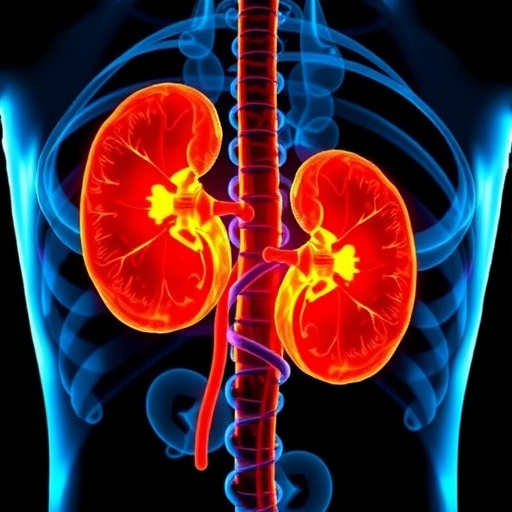In the landscape of critical medicine, the management of sepsis remains a complex and significant challenge. As clinicians constantly seek better therapeutic strategies to improve patient outcomes, recent research has shed new light on the use of albumin in the treatment of sepsis. A study led by Li, Chen, and Qu, published in Military Medicine Research, examines the nuanced relationship between early albumin administration and the risk of developing acute kidney injury (AKI) in patients suffering from sepsis. This critical inquiry into the role of albumin in sepsis management opens doors for both clinical practice and research.
Sepsis, characterized by a dysregulated host response to infection, poses an imminent threat to organ function, including the kidneys. Acute kidney injury is a common and distressing consequence of sepsis, significantly complicating patient management and prolonging hospital stays. The study under consideration investigates whether early administration of albumin, a protein that plays various roles in maintaining oncotic pressure and modulating inflammation, might unintentionally exacerbate this renal complication in sepsis patients.
Traditionally, albumin has been employed in critical care to restore intravascular volume and improve circulation. However, as the researchers delved deeper, they identified a paradoxical association between early albumin treatment and heightened risk for sepsis-associated AKI. This encourages a reevaluation of established clinical practices that could inadvertently harm rather than help patients. The findings initiate a critical dialogue among healthcare professionals about the complexities of albumin use.
This rigorous study utilizes a novel method known as target trial emulation to simulate randomized controlled trials. By recreating the conditions of a clinical trial, the researchers aimed to eliminate confounders and bias that often plague observational studies. This emulation allows for a clearer understanding of how albumin interacts with renal physiology in the context of sepsis, presenting compelling evidence that could shift current paradigms around its use.
The implications of the study extend beyond theoretical discussions. The data suggests that in certain clinical contexts, such as among critically ill patients with sepsis, the routine use of albumin may not only lack benefit but could be detrimental. Shifting the paradigm of treatment requires clinicians to critically assess the timing and context of interventions. As sepsis continues to be a leading cause of morbidity and mortality worldwide, understanding these nuances is paramount.
Additionally, concerns about the cost-effectiveness of albumin therapy in sepsis management come into play. Given the high expense associated with albumin solutions, its use must be judiciously evaluated against the backdrop of potential adverse outcomes. With the findings indicating a possible increase in AKI with early administration, healthcare institutions may need to reconsider resource allocation strategies in treating sepsis.
Importantly, while the study highlights risks associated with early albumin use, it does not negate the potential therapeutic benefits in specific scenarios. Albumin’s role in modulating inflammation and maintaining oncotic pressure could still be invaluable, but its application must be selective and evidence-based. Personalized medicine, where treatment protocols are tailored to individual patient circumstances, may become even more critical in the management of sepsis and its complications.
The researchers call for further investigations to map out the precise mechanisms through which albumin may aggravate renal injury in septic patients. Are there specific subpopulations that might benefit from its early administration? What patient characteristics should guide clinicians in their decision-making processes? These questions highlight the need for ongoing research in the field, which could ultimately refine patient-centered approaches to sepsis care.
The finding is especially pertinent given the variability in clinical practices globally. Different regions may have different protocols concerning fluid administration, and standardizing evidence-based guidelines that incorporate findings from this study could optimize patient outcomes worldwide. The challenge lies in communicating these insights effectively within the medical community to foster widespread adoption.
As discussions around sepsis treatment evolve, this research reminds us that medical practice is not static. It emphasizes the importance of integrating new findings into clinical guidelines and encourages a culture of questioning and reevaluation. Continuous education and training become essential as doctors grapple with the ever-changing landscape of sepsis management.
In conclusion, the work by Li et al. marks a pivotal point in our understanding of albumin administration in sepsis patients. It challenges long-held assumptions, pushes the boundaries of critical care research, and encourages clinicians to approach treatment with a more nuanced understanding of risks and benefits. As more studies unfold in this arena, the ultimate goal remains clear: to enhance the quality of care provided to sepsis patients and, in turn, improve survival rates.
The implications of this research could be profound, potentially influencing future guidelines and clinical protocols in sepsis management. As healthcare professionals integrate these findings, the hope is to foster an era of improved monitoring and tailored treatments that could lead to better patient outcomes, thereby decreasing the burden of this serious condition.
As the academic and clinical discussions around this topic continue, it is imperative to remain vigilant to new evidence emerging from ongoing research. The medical community must commit to staying abreast of such developments, as they hold the key to advancing patient care in the context of sepsis and other critical illnesses.
Subject of Research: Early use of albumin and the risk of sepsis-associated acute kidney injury.
Article Title: Early use of albumin may increase the risk of sepsis-associated acute kidney injury in sepsis patients: a target trial emulation.
Article References:
Li, XY., Chen, WS., Qu, ZK. et al. Early use of albumin may increase the risk of sepsis-associated acute kidney injury in sepsis patients: a target trial emulation. Military Med Res 12, 51 (2025). https://doi.org/10.1186/s40779-025-00641-z
Image Credits: AI Generated
DOI: 10.1186/s40779-025-00641-z
Keywords: Sepsis, Acute Kidney Injury, Albumin, Critical Care, Target Trial Emulation.




